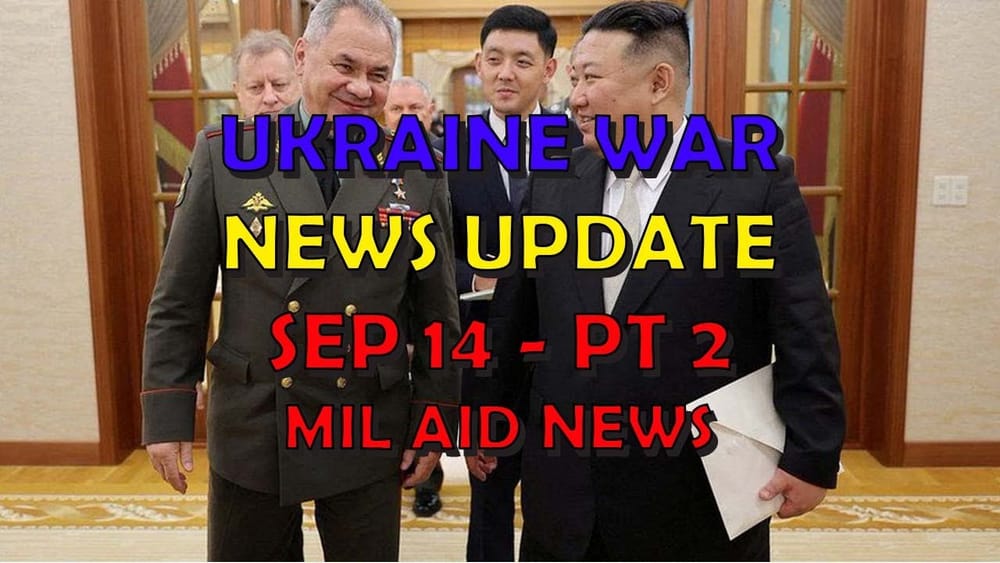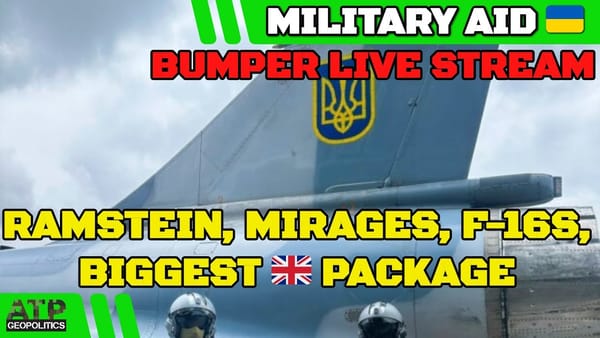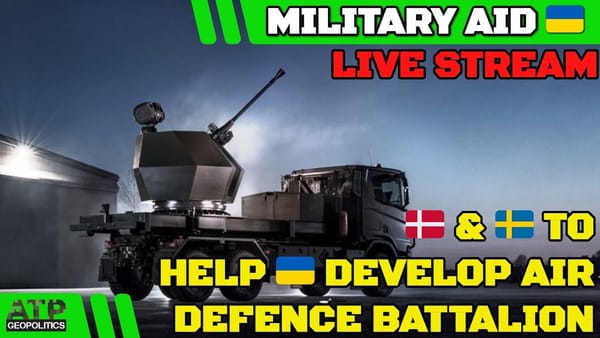Ukraine War Update NEWS: Military Aid News
Table of Contents 📖
"North Korea is rapidly transforming into a giant weapons factory for any global terrorist project willing to pay"
Hello Team
🎦 00:00-00:15⏩
Jonathan welcomes viewers to another ATP Geopolitics video, a Ukraine War News Update, part B for 14th September 2024. Jonathan mentions that he's desperate for a cuppa before getting started.
Return to top⤴️
Western Long Range Weapons & Support for Ukraine
🎦 00:15-12:24⏩
Jonathan discusses the implications of UK Prime Minister, Kier Starmer's recent meeting with US President Joe Biden and the ongoing debate concerning the use of western weapons deep into Russian territory. Key points raised:
- Speculation is rife that the meeting, called for by the UK, centred around a potential agreement to allow Ukraine to strike targets within Russia using Storm Shadow Missiles.
- While no official announcement has been made, The Guardian reports sources suggesting London and Washington have agreed to authorise such strikes.
- John Kirby, US National Security Spokesperson, confirmed that the US would not alter its policy but could not speak for the UK or France.
- Zelensky has been requesting authorisation for such strikes for months, viewing them as crucial for self-defence and impeding Russia's war efforts.
- Jonathan reads extracts from an article in The Guardian about the meeting in which Biden dismisses Putin's threats and Starmer is quoted as saying "I do not think much of Vladimir Putin" in response to a question.
- Putin warned that permitting Ukraine to utilise Western-made long-range missiles against Russia would be tantamount to NATO engaging in direct conflict with Russia.
- Trudeau, however, voiced Canada's complete backing for Ukraine's use of long-range weapons, aiming to thwart Russian attacks on civilian infrastructure. Similarly, Sweden and Finland confirmed Ukraine faces no restrictions on deploying their weapons against Russian territory, directly challenging Biden's stance.
- Jonathan shares insights from Jakub Janowski downplaying the significance of extending Western support to include strikes against military targets within Russia. He notes Western involvement in intelligence and analysis for Ukrainian military operations has been ongoing for years.
- Jonathan then shares insights from Paolo Massetti on Ukrainian war analyst Michael Kaufman's stance, who argues that the matter extends beyond mere missile provision.
- Kaufman highlights the substantial intelligence and logistical support required for such operations, suggesting they effectively constitute joint NATO-Ukraine campaigns, with NATO personnel indirectly involved in attacks against targets within internationally recognised Russian borders.
- Kaufman emphasizes that while some may downplay the significance of this threshold, the decision rests with those responsible for navigating the potential ramifications.
- Jonathan acknowledges Western assistance in satellite imagery and military intelligence, specifically citing France, the UK, and the US, lending credence to Kaufman's perspective.
- Kaufman contends policymakers’ primary apprehension lies not with nuclear escalation but rather horizontal escalation. He posits that Russia might retaliate by disseminating advanced military technology, expertise, and personnel to actors like the Houthis in Yemen, potentially empowering them to disrupt major maritime shipping routes. Such actions, while not posing a direct threat to the US, would have global economic consequences.
- Jonathan acknowledges this as a valid concern, citing instances of the Houthis utilising unexpectedly sophisticated anti-ship missiles and drones, hinting at potential Russian involvement. Disrupting the Red Sea trade route would predominantly impact nations other than Russia, potentially benefiting China. He underscores the potential for significant global economic disruption resulting from Russia's actions in response to Western support for strikes within its borders.
- Further concerns revolve around the escalation of Russian sabotage operations within Europe, exemplified by notable incidents over the past year. The potential for future conventional or asymmetric retaliatory actions by Russia remains a point of contention.
- Jonathan expresses his dislike for the term "asymmetric" while acknowledging its common usage. He clarifies he doesn't anticipate a direct Russian attack on a NATO country but emphasizes alternative avenues for retaliation exist. While some might argue such retaliatory actions are already occurring, he stresses the importance of understanding policymakers' perspectives and the need for a well-informed discussion on this critical issue.
- Ultimately, those advocating for crossing this threshold must demonstrate the benefits outweigh the risks, highlighting the complexity of the deliberations occurring in meetings like Biden and Starmer's.
Germany Refuses to Send Taurus Missiles to Ukraine
🎦 12:24-13:15⏩
Jonathan covers Germany's stance on providing long-range missiles to Ukraine. Key points:
- Germany maintains its refusal to supply Taurus long-range missiles despite Ukraine's request.
- Chancellor Scholz affirms the decision is final and not open for reconsideration.
- While the US and the UK deliberate expanding Ukraine's strike capabilities, German officials maintain their discussions on these weapons are their own and do not involve Germany.
- Zelensky believes that US-supplied ATACOMs are ineffective without the capacity to target Russian territory, citing their limited quantity and restrictions imposed by Western partners on striking deep within Russia.
Russia - Potential Responses to Western Supplied Long-Range Weapons
🎦 13:15-16:49⏩
Jonathan examines potential Russian responses to the West permitting Ukraine to strike targets within its borders using long-range missiles. Key points:
- Citing a Reuters report, Putin's retaliatory options could involve striking British military assets near Russia or, in an extreme scenario, conducting a nuclear test as a show of force.
- Jonathan believes that, while extreme, Putin may feel compelled to react with a more overt demonstration of force for his domestic audience.
- Providing weapons to the Houthis to target international trade routes, while potentially effective, would be difficult to publicly justify to the Russian people. Such actions would likely be communicated through back channels to the US and the UK.
- Jonathan expresses scepticism about Russia's targeting of British military assets near Russia, deeming it unwise and potentially triggering Article 5 of the NATO agreement.
- Jonathan highlights a Bloomberg report suggesting the Kremlin may escalate sabotage and cyberattacks against NATO if Ukraine gains the capacity to strike Russia with Western weaponry. This form of asymmetric retaliation aligns with Michael Kaufman's analysis and is considered highly probable.
- The potential for Russian attacks, directly or indirectly, on US forces in regions like the Middle East is also considered.
- Jonathan argues that Russia possesses an asymmetric advantage in its capacity to inflict damage, particularly through cyberattacks, potentially targeting critical infrastructure such as healthcare systems. While acknowledging the simplification of the scenario, he emphasizes that Russia's potential to cause harm outweighs the potential for reciprocal damage from Western nations.
- He hypothesises that a desired outcome would be to cripple Russia to the point of political collapse.
US Ukraine Presidential Drawdown Authority Update
🎦 16:49-18:06⏩
Jonathan provides an update on the US's Ukraine Presidential Drawdown Authority (PDA). Key points:
- The Department of Defense (DoD) confirms $5.9 billion remains in the Ukrainian Presidential Drawdown Authority, with all but $100 million set to expire on October 1st.
- The DoD plans to continue delivering drawdown packages shortly and is actively seeking Congressional approval for an extension of PDA authorities.
- Jonathan explains that the $100 million exception exists because the US administration can annually allocate this amount to any recipient worldwide at their discretion without Congressional approval.
- He highlights the urgency of the situation, emphasizing the need for swift Congressional action to ensure continued aid to Ukraine and avoid a potential funding crisis.
Poland Considers Sending More Mig-29s to Ukraine
🎦 18:06-18:47⏩
Jonathan discusses Poland's potential transfer of additional MiG-29 fighter jets to Ukraine. Key points:
- Polish Foreign Minister, Sikorsky, confirms Poland's consideration of sending more MiG-29s to Ukraine.
- The potential transfer hinges on partner nations assisting with equipment to bolster Poland's air defence capabilities.
Hawkeye Mobile Howitzer Prototype Spotted in Ukraine
🎦 18:47-19:58⏩
Jonathan discusses the recent sighting of a US-supplied Hawkeye 105mm self-propelled Howitzer in Ukraine. Key points:
- Photographs of the Hawkeye 105mm self-propelled Howitzer prototype in Ukrainian service have surfaced, potentially marking its first operational appearance.
- Jonathan describes it as a smaller, self-propelled Howitzer mounted on the back of a Humvee-type vehicle.
- AM General representative Mike Evans revealed in a June interview that a prototype was delivered to Ukraine in April.
- Despite its potential for "shoot and scoot" tactics, Jonathan highlights the vulnerability of such vehicles during relocation due to drone surveillance. Nevertheless, he acknowledges it's a valuable addition to Ukraine's arsenal.
Roshel Defence Increases Production of Senator APC
🎦 19:58-21:27⏩
Jonathan discusses Roshel Defence, a Canadian defence contractor, and their increased production of the Senator Armoured Personnel Carrier. Key Points:
- Roshel Defence, known for its Senator APCs, has developed a mine-resistant ambush-protected variant.
- This Canadian firm has provided a substantial number of these vehicles to Ukraine, potentially exceeding 1,500. Jonathan speculates that other nations may be placing orders due to the Senator's effectiveness.
- Jonathan notes that equipment supplied to Ukraine often gains international attention and subsequent orders, citing it as a potential opportunity for the Russian arms industry. However, he expresses uncertainty whether this scenario has occurred.
- Originally designed as a security van for transporting cash, the Senator APC has been up-armoured and adapted into various configurations for military use in Ukraine.
- Production has surged to an impressive nine vehicles per day, seven days a week. Jonathan is unsure who commissioned this production increase but hopes a significant portion is destined for Ukraine.
- Colby Badwar, a defence analyst, highlights the Senator's features and capabilities as a testament to its utility on the battlefield.
Germany's Contribution to the Czech Ammunition Initiative
🎦 21:27-22:44⏩
Jonathan discusses Germany's contribution to the Czech ammunition initiative. Key points:
- Colby Badwar highlights Germany's substantial financial support for the Czech ammunition initiative, contrasting it with other countries that have pledged minimal amounts or failed to deliver on commitments.
- Although Poland initially faced criticism for delayed funding, attributed to legal complexities and the pursuit of a specific individual, they have since pledged $100 million to the initiative.
- Jonathan acknowledges Germany frequently receives criticism for its stance on Taurus missile supplies but emphasizes their commendable efforts in other areas. He cites Rheinmetall's significant support for Ukraine as a prime example.
- Jonathan concludes that Germany's contributions within the context of the Czech initiative have been exceptional.
Ukraine Begins Domestic Production of 155mm Artillery Shells
🎦 22:44-23:09⏩
Jonathan covers Ukraine's recent announcement to begin domestic production of 155mm artillery shells. Key points:
- Ukraine officially announces the commencement of its own 155mm artillery shell production.
- This development is viewed as a crucial step towards self-sufficiency for Ukraine, as highlighted by defence analyst Terminal de Malvin Safer.
Ukraine Seeks 12 Viper Attack Helicopters Initially Intended for Slovakia
🎦 23:09-25:03⏩
Jonathan discusses Ukraine's interest in acquiring 12 Viper attack helicopters originally slated for Slovakia. Key Points:
- Ukraine is actively lobbying Washington to secure 12 AH-1Z Viper attack helicopters initially intended for Slovakia. This interest has intensified amidst uncertainty surrounding the Slovak government's commitment to the purchase due to a change in administration.
- The US State Department had granted tentative approval for the sale of 12 Bell-manufactured Vipers to Slovakia at an estimated cost of $600 million, marking a significant price hike from the initial offer of $340 million presented to the previous Slovak government.
- The initial price reduction stemmed from the deal's original recipient, Pakistan, falling through. Slovakian authorities are attempting to detach the discount from the Vipers and apply it to other prospective acquisitions such as F-16 fighter jets and air defence systems. This manoeuvre has drawn criticism from Washington, according to an industry source speaking anonymously to Defence News.
- A Ukrainian lawmaker revealed to Defence News that their interest in the 12 Vipers dates back to 2022.
- While acknowledging the benefits of acquiring these helicopters, Jonathan points out the logistical challenges related to training, maintenance, and their operational footprint. Nevertheless, he sees potential in the endeavour, emphasizing the importance of securing any and all available resources.
Ukraine Shows Interest in Obsolete Italian Military Equipment
🎦 25:03-25:11⏩
- Jonathan mentions that Ukraine is also looking to acquire obsolete military equipment from Italy. He clarifies that the aforementioned Viper helicopters are not considered obsolete.
Ukrainian Forces Successfully Test Rocket Launcher Drone
🎦 25:11-26:26⏩
Jonathan reports on the successful testing of a rocket-launcher drone by Ukrainian forces. Key points:
- Wild Hornets, a drone manufacturer, announces the successful testing of the world's first rocket-launcher drone.
- The Balava drone unit, part of a separate presidential brigade named after Bohdan Khmelnytsky, successfully mounted a rocket launcher onto a Queen Hornet FPV drone.
- This innovation enables an ordinary rocket launcher to operate from a distance exceeding five kilometers, opening new possibilities for Ukrainian forces.
- Wild Hornets, committed to ongoing innovation and collaboration with the Bulava drone unit, aims to transition this prototype into mass production to support the Ukrainian military.
- Jonathan praises Wild Hornets, describing them as an excellent organisation dedicated to aiding the Ukrainian military. He notes that the key challenge likely revolves around mitigating recoil. However, this becomes less of a concern if the rockets are self-targeting.
- Jonathan commends Wild Hornets for their dedication to incorporating front-line feedback and consistently developing increasingly effective equipment for the Ukrainian armed forces.
New Zealand Charity Donates Ambulances to Ukraine
🎦 26:46-27:40⏩
Jonathan discusses the donation of ambulances to Ukraine by a New Zealand charity. Key points:
- Former Tauranga mayor Tembi Powell's charity has donated 16 decommissioned ambulances to Ukrainian armed forces.
- Jonathan expresses interest in interviewing Tembi Powell, acknowledging his commendable support for Ukraine. He appeals to his viewers to connect him with Powell.
NATO Could Have Done More to Deter Russia
🎦 27:40-28:26⏩
Jonathan discusses outgoing NATO Secretary General Jens Stoltenberg's admission that NATO could have done more to deter Russia from invading Ukraine. Key points:
- Outgoing NATO Secretary General, Jens Stoltenberg, acknowledges that NATO could have taken more substantial action to prevent Russia's full-scale invasion of Ukraine.
- Jonathan interprets Stoltenberg's statement as an admission that NATO's efforts were insufficient and hopes they are currently providing adequate support to Ukraine.
India Secures Early Release of 45 Citizens from Russian Army
🎦 28:26-30:42⏩
Jonathan discusses the release of Indian citizens who were tricked into joining the Russian army. Key Points:
- The Indian Foreign Ministry reports that 45 Indian citizens who were misled into enlisting in the Russian army have been granted early dismissal.
- This follows discussions between Indian Prime Minister Modi and Putin during Modi's visit to Moscow. India had expressed displeasure over its citizens being enticed into joining the Russian military and fighting in Ukraine.
- Indian authorities are seeking the release of an additional 50 individuals. The Indian Foreign Ministry estimates that 35 to 50 Indian citizens were serving in the Russian army.
- Indian authorities previously uncovered a network of recruiters who deceived Indian citizens with promises of employment, university enrollment, and visa assistance, only to confiscate their passports and deploy them to the Ukrainian conflict zone. NDTV estimates roughly 100 Indian nationals fell victim to this scheme, with four confirmed fatalities.
- The Russian embassy in New Delhi denies any involvement in public or clandestine recruitment campaigns targeting Indian citizens for military service in Russia. Jonathan responds with scepticism, implying a history of dishonesty from Russian authorities.
North Korea: A "Giant Weapons Factory"?
🎦 30:42-32:12⏩
Jonathan covers North Korea's growing role as an arms supplier and its deepening alliance with Russia. Key points:
- Jonathan highlights North Korea's rapid transformation into a significant arms manufacturer, fulfilling global demand. He shares JNKiev's perspective, who perceives North Korea as a willing supplier to any terrorist organisation with the means to pay.
- Jonathan reiterates previous reports about Russian Defence Minister Sergei Shoigu's visit to North Korea to solidify the strategic alliance between the two nations.
- Kim Jong-un reaffirms North Korea's commitment to strengthening cooperation with Russia based on their strategic partnership.
- Jonathan finds it intriguing that a bilateral agreement seemingly mirrors NATO's Article 5, potentially obligating North Korean military intervention alongside Russia in scenarios like the recent incursion into Kursk by Ukrainian forces.
- Jonathan concludes that Russia's reliance on nations like Iran, North Korea, and particularly China, is a concerning development, especially considering China's substantial support for Russia's drone capabilities used against Ukraine. He advocates for a Western response to curb this assistance.
Wrap up
🎦 32:12-33:39⏩
- Jonathan thanks his viewers for watching.
- Jonathan then proceeds to discuss his preference for appropriately sized tea mugs and the importance of using the right glassware for beverages.
- Jonathan signs off.




